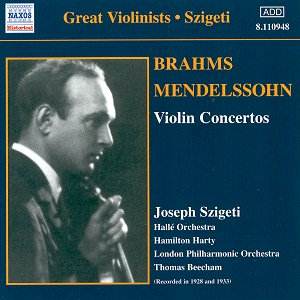My advice is to start with the Brahms. Not that the
Mendelssohn is a poor performance – far from it – but it does go some
way to bearing out Albert Sammons’ contention that there are more poor
performances of the Mendelssohn by good violinists than of any other
major concerto in the repertoire. This was one of three Concerto recordings
Szigeti made with Beecham and the LPO – the others were the discographical
first, Prokofiev No 1, and a most beautiful Mozart K218 – and by some
distance the weakest. Graceful and attractive though it is, these features
also co-exist with some tonal limitations and technical frailties sufficient
to limit its place in the hierarchy of great recordings of this work.
Szigeti had a tightly focused tone and a characteristically
slow vibrato, endemic to Hubay pupils, and to which he devoted considerable
attention after his early wunderkind years. His portamenti are quick,
the tone a little tremulous in the first movement of the Mendelssohn
and the passagework exposes some chinks in his technical armoury. In
the slow movement he employs rather more slides in the opening paragraph
than many of his contemporaries and some throbbingly emotive lower string
passages (which, because of that slow vibrato, are a little problematic).
Some of the playing here is a little smeary but nothing is overly sentimentalised.
The finale is the best played of the movements, with the LPO in crisp
and affectionate form and Szigeti serves up some witty and warmly persuasive
playing. I like the way Beecham propels the orchestral counter themes
– projected in addition with warmth as well as clarity. There’s nothing
over studied or over assertive in a finale often used as a vehicle for
velocity.
It is the Brahms however that receives one of the most
outstanding recordings made of the Concerto. Criticism has often been
levelled at the Halle in this recording and in particular at the oboist,
whom Tully Potter notes was Alec Whittaker, soon to be poached from
the Halle by the marauding BBC. In addition the string section employ
a massed, uniform series of portamenti at various points which can impart
a decidedly tremulous air to some of the orchestral expositions. Nevertheless
the orchestral patina is distinctive, individual and rampantly engaged
and Whittaker’s pre-Goossens playing is stylistically and historically
important. In the portamento laden first movement orchestral tutti,
for example, the strings’ aesthetic is not dissimilar in intent – though
undeniably distinct in execution from - the soloist’s. Szigeti’s robust,
if small, tone doesn’t indulge in nearly as much portamenti as he was
to do a few years later in the Mendelssohn. He projects his line with
admirable and rugged surety. Harty encourages a triumphantly cohesive
performance – listen, in passing, to the basses’ momentum for example.
The wind section may sound thin but there is a tonal conformity to the
blend. In the second movement, following Whittaker’s solo, Szigeti unravels
his never gluttonous resources and as the movement develops we can hear
the subtlety with which he increasingly deploys finger position changes
and the most fleet of portamenti and how he never lavishes tone and
sacrifices architectural design and how much more effective and convincing
his understanding is as a result. In the finale his accents are robust,
excellently attacked and with Harty (whose Concerto Szigeti had premiered
in 1908) they drive to a triumphantly, if not always impeccably, overwhelming
conclusion.
Transfers are good – preserving Szigeti’s famously
split note toward the end of the Mendelssohn slow movement – and make
this disc, at least for the Brahms, mandatory listening.
Jonathan Woolf


